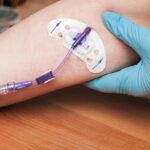
Intravenous Immunoglobulin (IVIG) is a medical treatment used to boost the immune system in people with certain autoimmune and immunodeficiency disorders. Patients undergoing IVIG treatment often ask the question: How will I know if IVIG is working effectively for me?
Treatment Info | Get IVIG Prior Authorization
IVIG therapy generally takes several days or sometimes even months to show its effects, depending on the individual’s disease severity and health status.
In this article, we will discuss some indicators and signs that could help you assess whether IVIG is working and delivering the intended benefits or not.
What Is IVIG?
IVIG stands for intravenous immunoglobulin, a treatment made from the blood plasma of thousands of healthy donors. The IVIG liquid comprises a mixture of antibodies that help patients with compromised or weakened immune systems combat infections as well as manage symptoms of certain autoimmune disorders.
Before exploring the ways to determine whether IVIG is working, let’s first understand how it works.
How Does IVIG Work?
When IVIG is administered via intravenous infusion, it introduces a pool of antibodies into your bloodstream. These antibodies serve several crucial functions:
- They neutralize harmful pathogens and fight off infection.
- They reduce inflammation.
- They modulate the immune system.
- They alleviate the symptoms of autoimmune disorders.
How To Tell If IVIG Is Working
In general, IVIG shows its effectiveness within a few weeks, although this timeline can fluctuate depending on your specific condition and response to the treatment. Your healthcare provider plays a vital role in assessing whether IVIG is working for you. They will closely monitor your progress and may adjust the treatment plan based on your response.
There are several indicators or positive signs that could help you determine whether IVIG is working effectively or not. These indicators include the following:
Improvement in Your Symptoms
One of the most apparent signs that can tell you if IVIG is working is a noticeable improvement in your symptoms. For example, if you are receiving IVIG to treat autoimmune conditions, like myasthenia gravis (MG) or Guillain-Barré syndrome (GBS), you may experience a reduction in muscle weakness or other relevant symptoms.
Since IVIG helps reduce inflammation around the nerves, you may feel greater muscle strength and better coordination during the IVIG treatment.
Similarly, you may also experience positive changes like reduced pain, fewer infections, or improved energy levels.
Reduced Infections
If you’ve been receiving IVIG to prevent recurrent infections, one sign that it’s working is that you would notice a reduction in the frequency and severity of your infections. Fewer infections indicate that the IVIG treatment is enhancing your body’s ability to fight off pathogens by strengthening your immune system.
Consult an IVIG Specialist | The Best IVIG Home Infusion | Get IVIG Treatment Assistance
Stable Blood Counts
In some cases, IVIG is administered to manage blood disorders such as immune thrombocytopenia (ITP) or hemolytic anemia (HA). Your healthcare provider will assess your blood counts to check whether IVIG is helping maintain stable levels of platelets or red blood cells.
Moreover, they will also run some laboratory tests to evaluate the effectiveness of IVIG. These tests measure specific markers in your blood, such as immunoglobulin levels and markers of inflammation. For instance, a significant decrease in inflammatory markers and an increase in immunoglobulin levels will indicate that IVIG is helping your immune system and preventing inflammation.
Improved Quality of Life
Since IVIG therapy aims to enhance your quality of life, you may notice a positive change in your overall well-being. This could include better sleep, improved mood, and a greater ability to participate in activities you enjoy. These improvements often become evident after a few treatment sessions.
Less Reliance on Other Medications
Over time, when you see IVIG becoming more effective in treating your condition, your dependence on other medications may be reduced. This will simplify your treatment regimen and reduce potential side effects from multiple medications.
It is not possible to determine if IVIG is working after only 1 or 2 cycles. The effects of IVIG can vary from patient to patient. Some individuals may experience benefits after a few treatment cycles, while others may take longer.
When to Consult Your Healthcare Provider
If you don’t notice any improvements or experience worsening symptoms, consult your healthcare provider to reassess your treatment plan. Your healthcare provider will change your IVIG dose and infusion cycle based on your response.
Get IVIG Copay Assistance | IVIG Financial Assistance
Conclusion
In conclusion, IVIG is a valuable medical therapy that can make a significant difference in the lives of individuals with immune-related disorders. But how do you tell if IVIG is working? To determine if IVIG is working, closely monitor your symptoms, take blood tests, and consult with your healthcare provider regularly. It is important to know that IVIG effects may take some time to become noticeable, so be patient and stay committed to your treatment plan.
Contact Us
By submitting, you agree to AmeriPharma’s Terms of Use, Privacy Policy, and Notice of Privacy Practice.
REFERENCES:
- Intravenous immunoglobulin (IVIG). https://rheumatology.org/patients/intravenous-immunoglobulin-ivig
- Katz, U., Achiron, A., Sherer, Y., & Shoenfeld, Y. (2007). Safety of intravenous immunoglobulin (IVIG) therapy. Autoimmunity reviews, 6(4), 257-259. https://doi.org/10.1016/j.autrev.2006.08.011
- Samuelsson, A., Towers, T. L., & Ravetch, J. V. (2001). Anti-inflammatory activity of IVIG mediated through the inhibitory Fc receptor. Science, 291(5503), 484-486. DOI: 10.1126/science.291.5503.484
- Simon, H. U., & Späth, P. J. (2003). IVIG–mechanisms of action. Allergy, 58(7), 543-552. https://doi.org/10.1034/j.1398-9995.2003.00239.x
This information is not a substitute for medical advice or treatment. Talk to your doctor or healthcare provider about your medical condition prior to starting any new treatment. AmeriPharma Specialty Care assumes no liability whatsoever for the information provided or for any diagnosis or treatment made as a result, nor is it responsible for the reliability of the content.
AmeriPharma Specialty Care does not operate all the websites/organizations listed here, nor is it responsible for the availability or reliability of their content. These listings do not imply or constitute an endorsement, sponsorship, or recommendation by AmeriPharma Specialty Care.
This webpage may contain references to brand-name prescription drugs that are trademarks or registered trademarks of pharmaceutical manufacturers not affiliated with AmeriPharma Specialty Care.

Dr. Mark Alfonso, PharmD was born and raised in Pueblo, CO. He received his pharmacy degree from the University of Colorado School of Pharmacy at the Anschutz Medical Campus in 2010. He was board certified in medication therapy management in 2022. The most rewarding part of his job is helping to answer patient questions and concerns. His areas of expertise are community pharmacy and medication therapy management. In his free time, he enjoys reading and running.



